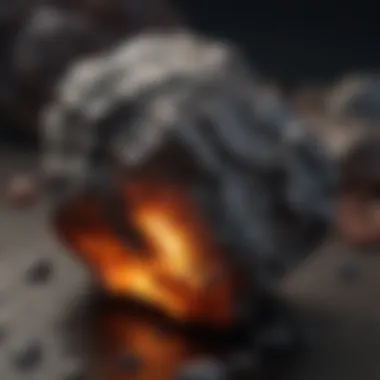Expert Guide to Selling Your Meteorite Successfully


Intro
Selling a meteorite is not just about parting with a piece of rock from space; it's a blend of science, art, and commerce. In a niche market where authenticity and knowledge matter greatly, understanding the terrain can set one apart. This section serves as a precursor, laying the groundwork for the detailed exploration to follow.
The future seller must consider various elements, including the means of sale, authenticating the meteorite, and understanding pricing dynamics. Additionally, one must navigate legalities that could impact the transaction. Rarely do opportunities arise where the blend of passion and profit coincides so significantly as in the world of meteorite sales.
By examining the methods, exploitable networks, and community dynamics surrounding meteorite selling, this guide aims to equip sellers with the tools needed not just to enter the market, but to thrive in it. Whether you are a seasoned collector or a first-time seller, knowledge is the key to successfully navigating this unique landscape.
Understanding Meteorites
Understanding meteorites is essential for anyone looking to sell these unique celestial fragments. Such knowledge provides insight into their nature and the market conditions surrounding them. Grasping what defines a meteorite not only helps in authenticating a specimen but also assists in setting the right expectations when selling.
Buyers often seek specific attributes when considering a meteorite purchase. They are usually educated on types of meteorites and their values. Therefore, sellers must be well-versed in this area. Knowledge of meteorite types, classifications, and unique features can significantly impact a sale, making it crucial for sellers to tailor their pitch accurately to potential buyers. This section will uncover the main characteristics of meteorites, exploring their classification and types, which ultimately affects their desirability and value in the marketplace.
What Constitutes a Meteorite?
A meteorite is essentially a solid fragment of a meteoroid that survives its passage through Earth's atmosphere and lands on the surface. This involves various scientific criteria that define a meteorite. Specifically, to be categorized as one, a specimen must be from outer space, showing signs of having experienced high temperatures and pressures during its journey through the atmosphere. Knowing this is vital for anyone looking to sell their meteorite, as buyers will expect proof of authenticity.
Types of Meteorites
Stony Meteorites
Stony meteorites are primarily composed of silicate minerals, which makes them the most common type of meteorite. Their key characteristic is their rocky appearance, often resembling terrestrial stones. This type of meteorite attracts many collectors due to its abundance and accessibility, making it a popular choice among novice meteorite enthusiasts. The unique feature is that they can sometimes contain vestiges of the solar system's early material. However, their widespread nature may result in lower individual value compared to rarer types.
Iron Meteorites
Iron meteorites make up a smaller portion of meteorite finds but are highly sought after for their metallic appearance and solid iron-nickel composition. The main aspect is their distinctive metallic luster, often resulting in impressive visual displays when polished. Collectors appreciate their rarity; however, the higher cost of obtaining these meteorites adds a layer of investment consideration for potential sellers. Their advantage lies in their ability to hold value well over time, making them a wise choice for long-term collectors. Still, they may also require special handling and displays, which could impose additional costs.
Stony-Iron Meteorites
Stony-iron meteorites are essentially a combination of stony and metallic elements. This duality makes them exceptionally intriguing and valuable. The key characteristic of stony-iron meteorites is their unique blend of silicate minerals and metal. They represent a transitional study between stony and iron meteorites. This complex composition makes them rarer and thus incredibly desirable for dedicated collectors. However, potential sellers must realize that their value can fluctuate widely based on market trends and availability, making accurate valuation essential.
Meteorite Classification
Composition Analysis
Composition analysis is central to understanding the makeup of a meteorite. It involves detailed study of the mineral constituents which can impact the perceived value. This method is not always straightforward but provides critical insights. Knowing the exact mineralogy is beneficial in the context of selling, aiding in authenticity checks and potential pricing strategies. Buyers often seek meteorites with rare or scientifically significant compositions, so understanding these factors allows sellers to market more effectively.
Structure and Texture
The structure and texture of a meteorite reflect its formation history and processing results. Analyzing these features can reveal whether a meteorite underwent significant transformations before landing on Earth. This aspect is crucial for collectors, as unique textures can denote authenticity and provenance. The importance of such characteristics cannot be overstated, as they help elevate a meteorite's status from merely interesting to scientifically valuable. Sellers should be aware of how these factors play into their selling strategy and highlight them in listings.
Determining Value
Understanding the value of your meteorite is crucial in selling it effectively. The price you assign to your meteorite should reflect not only its intrinsic properties but also market dynamics. For those new to selling meteorites, grasping how to evaluate their pieces can dramatically influence the success of a sale. Aligning your expectations with the actual market conditions can help you avoid pitfalls and enhance your return.
Factors Influencing Meteorite Value
Rarity
Rarity is one of the most significant factors affecting meteorite value. Generally, the less common a meteorite type is, the higher its market value. Collectors actively seek rare specimens, making rarity a desirable characteristic. A unique meteorite can command much higher prices due to the scarcity. However, rarity does not always guarantee a high value. Some rare meteorites may not be in high demand, impacting their sellability.
Size and Weight


The size and weight of a meteorite often play a critical role in its valuation. Large specimens typically attract more interest and thus can fetch higher prices. Weight here means something distinct as larger meteorites are easier to display and can often become conversation starters. That said, buyers may be cautious if the size exceeds their preferred handling capacity. Thus, while a large meteorite can be eye-catching, it may limit the potential buyer pool.
Provenance
Provenance refers to the history and verified authenticity of a meteorite. It can significantly enhance a meteorite's value. Knowing where the meteorite originated and any prior ownership can reassure buyers about its authenticity. Regularly, buyers prefer meteorites with a rich history or notable past owners. However, tracking provenance can be challenging, and it may involve extra research. A lack of confirmed provenance may lead to lower offers, as buyers may express skepticism about the meteorite's true origins.
Market Trends
Recent Sale Prices
Monitoring recent sale prices gives insight into current market conditions. Observing the sale prices of similar meteorites can help sellers gauge the fair market value for their own pieces. Websites dedicated to meteorite trading, like those mentioned on platforms such as en.wikipedia.org or reddit.com, might provide relevant data for comparisons. Recent trends can also indicate shifts in interest, possibly affecting the pricing of certain types.
Demand for Specific Types
Just as important as historical prices, the demand for specific meteorites today plays a critical role in valuation. Some meteorites may see spikes in interest due to scientific discoveries or media coverage, increasing their market value. Sellers should research trends in demand to find niches where their meteorite can thrive. In contrast, types that have fallen out of favor may struggle to achieve a good price.
Professional Appraisal
Finding an Appraiser
To determine an accurate value, seeking a professional appraiser is a smart step. A qualified appraiser can provide insights based on extensive experience and knowledge about meteorites. They will assess your meteorite's characteristics, market conditions, and comparable sales. Using someone who specializes in meteorite appraisal will often result in a more realistic valuation, providing confidence when engaging with potential buyers.
Costs Involved
Understanding the costs associated with appraisal is equally important. Professional appraisals generally charge fees, which can vary based on the appraiser's credentials and the meteorite's complexity. Keep in mind that while an upfront fee may seem like an expense, it might ultimately lead to a more profitable sale. Recognizing the potential return on investment can justify these costs.
Where to Sell Your Meteorite
Identifying the right avenue to sell your meteorite is essential for achieving a favorable transaction. This section explores various options available, offering distinct benefits and considerations. Understanding where to sell can help in reaching potential buyers who recognize the true value of your collection.
Online Marketplaces
E-commerce Platforms
E-commerce platforms, such as eBay and Etsy, have become prominent places for selling meteorites. They allow individuals to reach a global audience with relative ease. The key characteristic of these platforms is the ability to list items quickly and access a large pool of potential buyers.
A unique feature of these platforms is the user-generated review system. Buyers often feel more secure purchasing from sellers with good ratings. This adds a layer of credibility, which can enhance your chances of a successful sale. However, sellers must be mindful of fees associated with transactions, which can vary significantly.
Advantages of using e-commerce platforms include a broad reach and flexible listing options. Nevertheless, competition can be fierce, and sellers might need to invest time in optimizing their listings to stand out.
Specialty Meteorite Websites
Specialty meteorite websites cater specifically to enthusiasts and collectors. Websites like Meteorite.com provide a targeted audience familiar with meteorite value. Their concentration on meteorites makes these sites a beneficial option.
A standout feature is the community of like-minded individuals who understand the intricacies of meteorite trading. It enhances trust and can lead to quicker transactions. These venues often have lower fees compared to mainstream e-commerce options.
Nevertheless, the audience may be smaller, which could limit exposure. Sellers should weigh this against the potential for more serious inquiries from knowledgeable buyers.
Auction Houses
Reputable Auction Houses
Reputable auction houses, such as Sotheby’s or Christie’s, offer an esteemed setting for selling high-value meteorites. They provide a means to reach collectors who value authenticity and heritage. Their key characteristic is the extensive vetting process, which ensures items meet strict standards.
Auction houses often feature unique marketing campaigns that can enhance the visibility of your meteorite. Successful auction sales can yield impressive results, but sellers must also consider the competitive nature of auctions.


It’s important to remember that auction houses typically charge significant commissions on sales, which can eat into profits.
Understanding Auction Fees
Understanding auction fees is crucial for anyone considering this route. Auctions usually have two types of fees: buyer's premium and seller's commission. The buyer's premium is added to the winning bid, while the seller’s commission is deducted from the auctioneer's end.
The key characteristic is transparency; reputable auction houses provide clear information on these costs ahead of time. Familiarizing yourself with this information helps set realistic expectations of your net gain from a sale.
While the auction format can drive up the sale price through competitive bidding, it also risks failing to meet reserve prices, which may lead to an item not selling at all.
Private Dealers
Finding a Reputable Dealer
Engaging with private dealers can be another viable option for selling your meteorite. The primary advantage here is dedicated attention and personalized service. A reputable dealer will usually provide a thorough appraisal and fair pricing.
The key characteristic of this approach is the potential for a rapid sale without the complexities of auctions or online listings. Dealers looking for inventory may be more inclined to purchase items quickly, depending on their current demand and market understanding.
Yet, it is important to conduct due diligence before engaging with a dealer. Ensure they have a good reputation and appropriate credentials within the meteorite community.
Consignment Options
Consignment options provide a middle ground for selling meteorites. With this method, sellers give their items to dealers or shops to sell on their behalf. The major advantage is the reduced need for direct involvement in the sales process; the dealer handles the marketing and transaction logistics.
A unique feature of consignment is that it can extend the reach of your sale to established markets. You may benefit from the dealer's network of clients. However, consignment may also lead to lower immediate returns as dealers typically take a percentage of the sale price.
Legal Considerations
Understanding the legal considerations when selling meteorites is essential for a successful transaction. Not only does it protect your interests, but it also ensures compliance with local and international laws. The ramifications of neglecting these legal aspects can lead to complications. Buyers are often keen on knowing the legitimacy of the meteorite they are purchasing. Furthermore, legal clarity can enhance your credibility as a seller.
Ownership Verification
Ownership verification is a crucial step in the process of selling a meteorite. This involves establishing that you have the right to sell the meteorite in your possession. Buyers will usually want reassurance that the meteorite is legally acquired. This is especially relevant in cases where meteorites may have somewhat ambiguous origins. Therefore, keep all documents related to the acquisition of the meteorite. If the meteorite was collected legally, or purchased from reputable sources, having proof of this is highly advantageous.
Export Regulations
International Trade Laws
International trade laws govern the export of meteorites across borders. These laws are complex, influenced by various treaties and agreements. It is critical to understand the laws relevant to your country and the country of the buyer. A unique feature of these international trade laws is their focus on protecting cultural heritage. Failing to navigate these regulations properly can lead to confiscation of the meteorites and severe fines. Such consequences make it essential for sellers to be thoroughly informed about how these laws operate and their impact on the transaction.
Permits Required
Permits required for exporting meteorites depend on the jurisdiction and the specific laws of the countries involved. This adds a layer of complexity to the selling process. Often, permits are required to confirm that the meteorite is not classified as a protected heritage item or part of a scientific collection. One characteristic of this regulatory requirement is that it can take time to obtain. Proactive sellers should begin this process early. Being diligent in securing the appropriate permits shows responsible selling practices and can further endear you to potential buyers.
Communicating with Buyers
Effective communication with buyers is essential in the meteorite selling process. This aspect not only helps establish trust but also aids in securing a positive experience for both parties involved. Clear communication sets the stage for successful transactions and opens the door for further networking opportunities within the meteorite collector community.
Crafting a Good Listing
Creating a compelling listing is vital when selling meteorites. A well-crafted listing draws potential buyers and showcases the uniqueness of the meteorite.
Clear Descriptions


A clear description is crucial for conveying relevant details about the meteorite. It should include specifics such as type, weight, dimensions, and provenance. The key characteristic of a clear description is its ability to eliminate ambiguity and provide potential buyers with all necessary information. Buyers feel more confident when they understand what they are considering purchasing.
One unique feature of clear descriptions is that they can prevent misunderstandings, which may lead to disputes later. While being concise, it is important to avoid jargon, making the description accessible to novices and experienced collectors alike. The disadvantage here may be oversimplifying complex characteristics, which could lead to an unintentional undervaluation of the specimen.
High-Quality Images
High-quality images play a significant role in attracting buyers. They showcase the meteorite's physical attributes clearly, allowing buyers to assess its condition and appeal effectively. The key characteristic of high-quality images is their ability to provide potential buyers with a close-up view of the meteorite's surface and texture.
One unique feature of high-resolution images is their role in establishing authenticity. When buyers can see detailed images, they may be more likely to trust the seller. Furthermore, good lighting and angles can enhance the visual appeal. However, images can sometimes fail to represent the true color or details due to lighting conditions, which might mislead buyers.
Responding to Inquiries
How you respond to inquiries can make or break a sale. Timely and informative responses foster a good relationship with potential buyers and can often lead to a successful transaction.
Being Transparent
Being transparent is fundamental to earning trust. It involves sharing all relevant information with potential buyers, including any flaws or uncertainties related to the meteorite. The key characteristic of transparency is honesty, which builds credibility.
A transparent approach creates a more relaxed atmosphere for negotiations. Buyers are more likely to engage with sellers who appear straightforward. However, overly disclosing information might lead to buyers doubting the seller's confidence in the item.
Negotiation Tactics
Negotiation tactics are also critical in the selling process. They can influence the final price and how quickly the transaction can occur. Key negotiation tactics include finding a middle ground and understanding the buyer’s concerns.
One unique aspect of negotiation tactics is the ability to adapt them based on the buyer's engagement level. Effective negotiators often use questions to gauge what the buyer values the most about the meteorite. Nevertheless, a downside could be coming across as too aggressive, potentially alienating potential buyers.
In summary, how sellers communicate with buyers significantly impacts their selling journey. By crafting compelling listings, maintaining transparency, and utilizing effective negotiation strategies, sellers can navigate the complexities of the market more efficiently.
Building a Collector Network
Establishing a collector network is crucial when selling meteorites. This network not only increases visibility but also adds credibility to your offerings. Collectors are often well-informed individuals who understand the nuances of meteorite valuation and authenticity. Having a solid network can lead to beneficial connections and insights that navigate the complexities of selling these cosmic collectibles.
Joining Meteorite Collecting Groups
It offers connections
Joining meteorite collecting groups provides opportunities for valuable connections. Many of these groups are composed of members who share similar interests. They can offer advice, potential buyers, or even collaboration on sales. The local meteorite community can be very supportive. One key characteristic of such groups is the shared passion among members. This connection often translates into trust. Such groups are popular choices for sellers because they create warm leads and foster relationships.
However, it's important to engage actively within these groups. Whether through online forums like Reddit or local meets, participating is essential. Failing to do so may limit the potential benefits.
It enhances knowledge sharing
Being part of meteorite collecting groups significantly enhances knowledge sharing. Members often exchange information on the latest market trends and pricing strategies. This aspect is key for sellers to make informed decisions. The groups provide unique access to expert opinions and experiences that can be incredibly beneficial. Collaboration can lead to more effective selling strategies and informed resource choices. Thus, enhancing collective understanding in the group can greatly benefit individual sellers.
Despite the benefits, it’s vital to approach this knowledge sharing with an open mindset. Leaders in the field often have insights that are invaluable, but they may expect reciprocation. Know the balance between learning and sharing.
Participating in Meteorite Shows
Finding Local Events
Finding local meteorite shows is another great way to build your collector network. These events gather enthusiasts, buyers, and sellers in one place. The main characteristic of these events is direct interaction. They allow collectors to view meteorites firsthand, promoting personal connections. Such face-to-face opportunities can be a significant advantage for sellers looking to establish rapport.
However, while beneficial, these events can sometimes be overwhelming. The diversity of participants may make it difficult for sellers to stand out. Selection on the part of the seller about how to present themselves is crucial.
Tips for Networking
Having effective networking tips transforms attendance at shows into genuine opportunities. Being approachable is one key guideline. This simple characteristic can stimulate conversations that lead to sales.
Additionally, having your meteorites well-prepared and displayed allows for a professional appearance. Sellers should carry business cards or share contact information easily. Reflecting professionalism often attracts interest. Keep in mind to follow up after the event as well. This simple act can convert a fleeting moment into lasting connections.
Engaging with the community at such events does require preparation. Therefore, sellers may sometimes find it demanding, both mentally and physically. However, the potential benefits far outweigh these challenges, making it a worthwhile endeavor to pursue locally.







